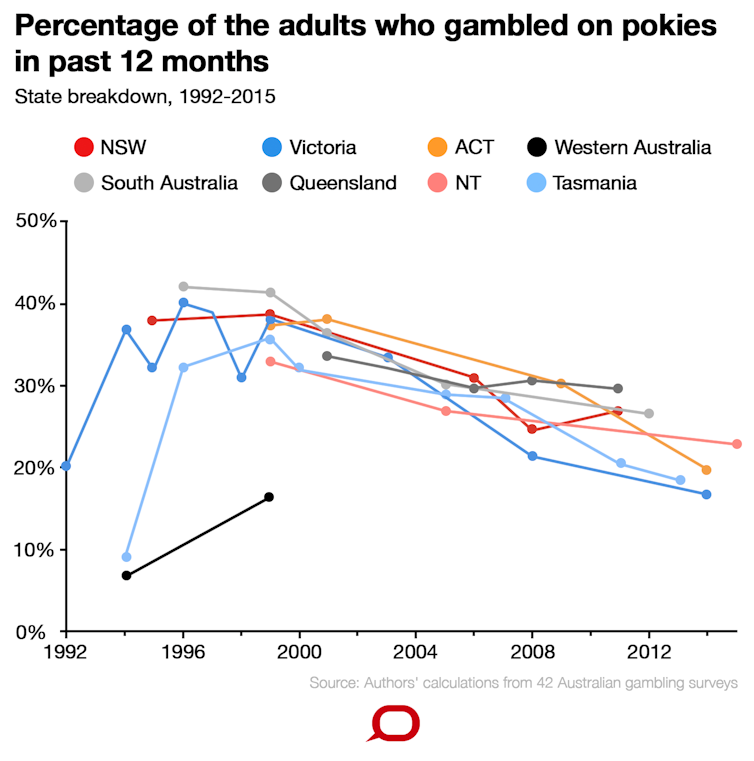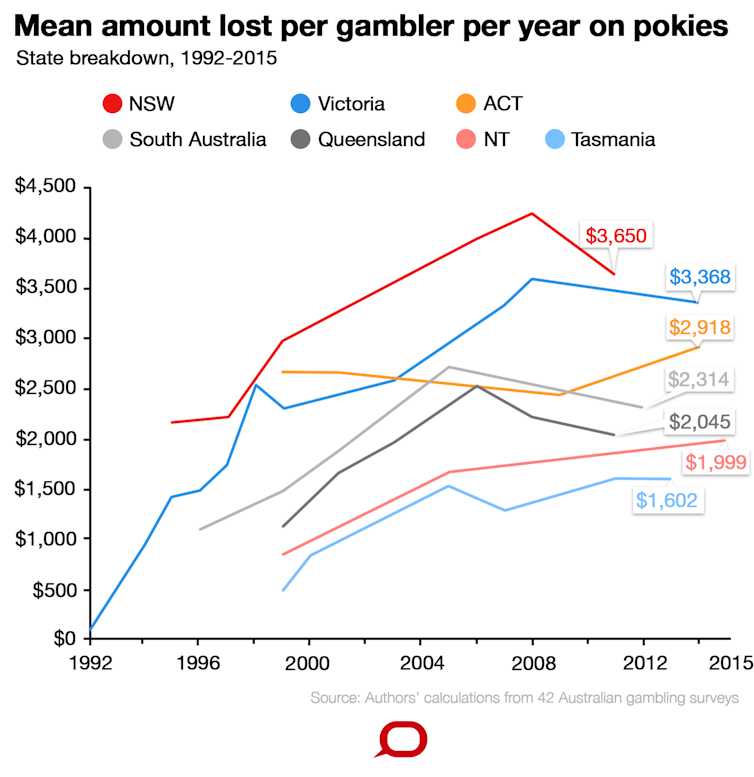Scott Morrison got the government re-elected on the back of a budget built on an illusion: that the economy was growing strongly and would go on doing so for a decade. The illusion allowed Morrison to boast about getting the budget back into surplus and keeping it there, despite promising the most expensive tax cuts we’ve seen.
Prime Minister Scott Morrison may have painted himself – and the economy – into a corner.
The illusion began falling apart even while the election campaign progressed. The Reserve Bank board responded to the deterioration in the economic outlook at its meeting 11 days before the election.
It’s now clear to me that it decided to bolster the economy by lowering interest rates, but not to start cutting until its next meeting, which would be after the election – next Tuesday.
If that wasn’t bad enough for Morrison, with all his skiting about returning the budget to surplus he may have painted himself – and the economy – into a corner.
In a speech last week, Reserve Bank governor Dr Philip Lowe made it clear that cutting interest rates might not be enough to keep the economy growing. He asked for his economic lever, “monetary policy” (interest rates), to be assisted by the government’s economic lever, “fiscal policy” (the budget).
He specifically mentioned the need to increase government spending on infrastructure projects, but he could have added a “cash splash” similar to those Kevin Rudd used to fend off recession after the global financial crisis in 2008.
See the problem? Any major slowdown in the economy would reduce tax collections and increase government spending on unemployment benefits, either stopping the budget returning to surplus or soon putting it back into deficit.
That happens automatically, whether the government likes it or not. That’s before any explicit government decisions to increase infrastructure spending, or splash cash or cut taxes, also worsened the budget balance.
And consider this. The Reserve’s official interest rate is already at a record low of 1.5 per cent. Its practice is to cut the official rate in steps of 0.25 percentage points. That means it’s got only six shots left in its locker before it hits what pompous economists call the “zero lower bound”.
RBA governor Philip Lowe has made clear the bank believes unemployment can fall much further without a threat of inflation
What happens if all the shots have been fired, but they’re not enough to keep the economy growing? The budget – increased government spending or tax cuts – is all that’s left.
The economics of this is simple, clear and conventional behaviour in a downturn. All that’s different is that rates are so close to zero. For Morrison, however, the politics would involve a huge climb-down and about-face.
The promised budget surplus also sent a message to voters that the Coalition could manage the economy, Bourke reported.
Oh dear. Bit early to be counting your chickens.
Prime Minister Scott Morrison may have painted himself – and the economy – into a corner.
The illusion began falling apart even while the election campaign progressed. The Reserve Bank board responded to the deterioration in the economic outlook at its meeting 11 days before the election.
It’s now clear to me that it decided to bolster the economy by lowering interest rates, but not to start cutting until its next meeting, which would be after the election – next Tuesday.
If that wasn’t bad enough for Morrison, with all his skiting about returning the budget to surplus he may have painted himself – and the economy – into a corner.
In a speech last week, Reserve Bank governor Dr Philip Lowe made it clear that cutting interest rates might not be enough to keep the economy growing. He asked for his economic lever, “monetary policy” (interest rates), to be assisted by the government’s economic lever, “fiscal policy” (the budget).
He specifically mentioned the need to increase government spending on infrastructure projects, but he could have added a “cash splash” similar to those Kevin Rudd used to fend off recession after the global financial crisis in 2008.
See the problem? Any major slowdown in the economy would reduce tax collections and increase government spending on unemployment benefits, either stopping the budget returning to surplus or soon putting it back into deficit.
That happens automatically, whether the government likes it or not. That’s before any explicit government decisions to increase infrastructure spending, or splash cash or cut taxes, also worsened the budget balance.
And consider this. The Reserve’s official interest rate is already at a record low of 1.5 per cent. Its practice is to cut the official rate in steps of 0.25 percentage points. That means it’s got only six shots left in its locker before it hits what pompous economists call the “zero lower bound”.
RBA governor Philip Lowe has made clear the bank believes unemployment can fall much further without a threat of inflation
What happens if all the shots have been fired, but they’re not enough to keep the economy growing? The budget – increased government spending or tax cuts – is all that’s left.
The economics of this is simple, clear and conventional behaviour in a downturn. All that’s different is that rates are so close to zero. For Morrison, however, the politics would involve a huge climb-down and about-face.
The promised budget surplus also sent a message to voters that the Coalition could manage the economy, Bourke reported.
Oh dear. Bit early to be counting your chickens.












